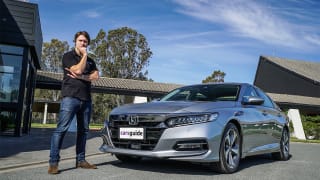
What's on this page
Honda Accord 2020
Carsguide Senior Journalist Tom White had this to say at the time: Honda’s new Accord is a miracle in that it was brought here seemingly simply for fan service.
You can read the full review here.This is what Tom White liked most about this particular version of the Honda Accord: Slick design, Brilliant packaging, Single well-specified variant
Honda Accord 2020 News
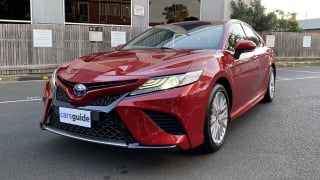
Is this the end of the road for Toyota Camry rivals?
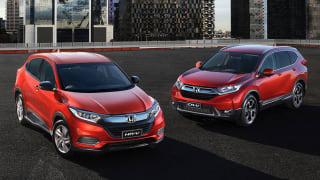
Is Honda about to revolutionise the way we buy cars?
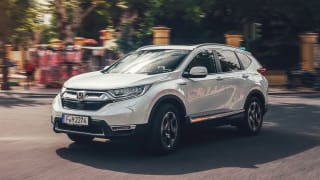
Honda Australia confirms every next-gen car will have hybrid drive
Honda Accord 2020 Q&As
Check out real-world situations relating to the Honda Accord here, particularly what our experts have to say about them.
-
I always think the cam drive system is a critical factor for engine reliability and longevity. Does Honda's Accord feature a timing chain or belt?
The question of a Honda Accord timing belt or chain is not exactly a simple one to answer as there have been various permutations of the Accord theme sold in Australia over the years. In fact, even though they all bore Accord badges, the various Accord models have often been quite different from each other, including some very different models that sold alongside each other at the same time. So here’s how it pans out:
Very early Honda Accords sold here used toothed rubber timing belts, but those cars from 1977 through to the mid-90s are now pretty old, hard to find and don’t really make it to most people’s short-lists when shopping for a new second-hand car.
Fast forward to 1997, and we start to get into cars that might still have some broad appeal as second-hand buys. Of those, the 1997 to 2003 Accord used two engines, a 2.3-litre four-cylinder and a 3.0-litre V6. Both those engines used a toothed, rubber timing belt which needs to be changed at 100,000km intervals.
For 2003 to 2007 Accords, the engine choices remained a four-cylinder and a V6, but now the former was from Honda’s K Series of engines and featured a timing chain rather than a rubber belt. The V6 remained the same as the previous model. For 2008 to 2013 Accords, the news was similar with the four-cylinder carried over (with its timing chain) and the V6 enlarged to 3.5 litres but still from the same family of engines (and still with its rubber timing belt). In fact, that was to remain a theme for the whole of Accord production with the smaller engine using a timing chain and the V6 getting a rubber belt. Even the very last Accord, the current-model, uses a turbocharged four-cylinder engine with a timing chain, while the hybrid Accord uses an unconventional petrol engine, also with a timing chain.
If, however, we’re talking about the Accord Euro which was sold here right alongside the Accord between 2003 and 2015, the question is a bit simpler as only one engine was offered in that car; a 2.4-litre four-cylinder which used a timing chain (it was also from Honda’s K Series family).
Beyond that, the task of the timing chain or timing belt is exactly the same: They take drive from the engine’s crankshaft to the camshaft and, in the process, keep all the moving parts in harmony. Many car makers moved away from a timing chain to the rubber, toothed drive belt as a way of simplifying engine design and driving down the cost of each engine. The rubber timing belt is also quieter in its operation and is also less prone to stretching (as a timing chain can) so the camshaft (commonly referred to as the cam) stays in perfect synch with the rest of the engine’s rotating parts. The timing belt is a simpler design because it doesn’t need to be tensioned via oil pressure from the engine as many timing chain systems are.
The timing chain, meanwhile, is preferred by some manufacturers because it should last the lifetime of the engine and never need replacement. This isn’t always the case, however, and some engines designs from a variety of manufacturers suffer problems in this regard. But, in a properly maintained engine of sound design, the timing chain should never need attention, while the rubber timing belt generally requires periodic replacement.
Show more -
Honda Accord: Key fob replacement
Without knowing more it's hard to give an accurate answer. There are circumstances where you can go to an automotie locksmith if a dealer is hard to get to. You can read more indepth information about how to replace your car keys here.
Show more -
Mazda 6 2004 vs Honda Accord 2008: Which should I buy?
Until you described the condition I would have said the Mazda, but if the condition were only fair I would think twice about it. On the surface it’s the better option, but I would want it checked by an expert to get a true reading on the overall condition. The Honda could be a good buy, the mileage isn’t excessive for the age, but you have to think about the future and what could happen in the next 2 to 3 years.
Show more -
How much is my 2005 Honda Accord worth?
Very little. If all was well with the car, and it was in good driving condition it’s only worth $3000-$4000, but if the automatic transmission has to be replaced it’s probably worth $500 or so.
Show more
Honda Accord 2020 Price and Specs
Pricing guides

| Honda Accord Model | Body Type | Specs | Price from | Price to | |
|---|---|---|---|---|---|
| VTI-LX 1.5L Turbo | Sedan | 1.5L ULP CVT AUTO | $41,140 | $48,400 | |
| VTI-LX 2.0L Hybrid | Sedan | 2.0L Hyb/ULP 1 SP AUTO | $43,780 | $50,930 | |
Honda Accord 2020 Wheel size
Wheel size for the 2020 Honda Accord will vary depending on model chosen, although keep in mind that many manufacturers offer alternate wheel sizes as options on many models.The wheel size available will alter the range of tyres available to be fitted. Standard wheel sizes on the Honda Accord spans from 18x8 inches.
| Honda Accord Model | Body Type | Front Tyre Size | Front Rim | Rear Tyre Size | Rear Rim | |
|---|---|---|---|---|---|---|
| VTI-LX 1.5L Turbo | Sedan | 235x45 R18 9 | 18x8 inches | 235x45 R18 9 | 18x8 inches | |
| VTI-LX 2.0L Hybrid | Sedan | 235x45 R18 9 | 18x8 inches | 235x45 R18 9 | 18x8 inches | |
Honda Accord 2020 Fuel consumption
Fuel consumption for the 2020 Honda Accord is dependent on the type of engine, transmission, or model chosen. The Honda Accord currently offers fuel consumption from 4.3 to 6.5L/100km. The Honda Accord is available with the following fuel types: ULP and Hyb/ULP.
| Honda Accord Model | Body Type | Specs | Fuel Consumption | |
|---|---|---|---|---|
| VTI-LX 1.5L Turbo | Sedan | 1.5L,ULP,CVT AUTO | 6.5L/100km | |
| VTI-LX 2.0L Hybrid | Sedan | 2.0L,Hyb/ULP,1 SP AUTO | 4.3L/100km | |
Honda Accord 2020 Dimensions
Dimensions for the 2020 Honda Accord are dependent on which body type is chosen. The maximum width and height is 1862mm x 1450mm and can vary on the basis of model.

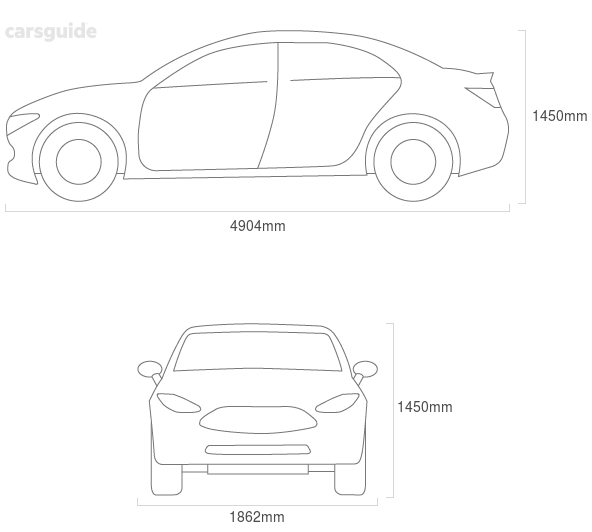
| Honda Accord Model | Body Type | Height x Width x Length | Ground Clearance | |
|---|---|---|---|---|
| VTI-LX 1.5L Turbo | Sedan | 1450x1862x4904 mm | 131 mm | |
| VTI-LX 2.0L Hybrid | Sedan | 1450x1862x4904 mm | 131 mm | |
Honda Accord 2020 Interior
The Honda Accord has taken a massive step forward when it comes to interior design. As these images show, it has a clean dashboard with a floating touchscreen multimedia system. There's also plenty of nice trim and lashings of leather throughout.


